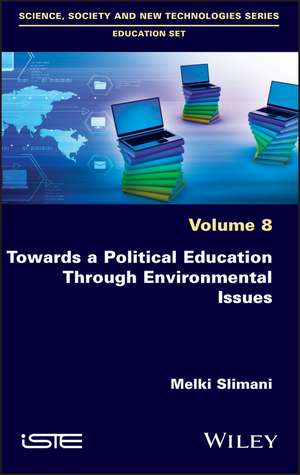Towards a Political Education Through Environmental Issues
Autor M Slimanien Limba Engleză Hardback – 21 iun 2021
Preț: 979.76 lei
Preț vechi: 1076.66 lei
-9% Nou
Puncte Express: 1470
Preț estimativ în valută:
187.50€ • 193.70$ • 156.05£
187.50€ • 193.70$ • 156.05£
Carte tipărită la comandă
Livrare economică 25 martie-08 aprilie
Preluare comenzi: 021 569.72.76
Specificații
ISBN-13: 9781786305886
ISBN-10: 1786305887
Pagini: 224
Dimensiuni: 165 x 239 x 18 mm
Greutate: 0.49 kg
Editura: ISTE Ltd.
Locul publicării:Hoboken, United States
ISBN-10: 1786305887
Pagini: 224
Dimensiuni: 165 x 239 x 18 mm
Greutate: 0.49 kg
Editura: ISTE Ltd.
Locul publicării:Hoboken, United States
Cuprins
Foreword ix
Introduction xiii
Chapter 1. The Political Trend in Environmental Issues 1
1.1. Politics, the political and depoliticization 1
1.2. The political and the anti-political 2
1.3. Environmental and development issues (EDIs) between the political and anti-political or politics and depoliticization: what are the trends? 3
1.3.1. Issues of environmental politics and environmental change 3
1.3.2. Environmental ethical issues 6
1.3.3. Sustainable development issues 8
1.3.4. Agrifood issues 9
1.3.5. Issues concerning environmental technology and environmental management 11
1.3.6. Issues of transitioning to sustainability 13
1.4. Conclusion 17
Chapter 2. The Political Potential of Environmental Issues 19
2.1. The regulatory categories of political life 19
2.1.1. Political philosophy approaches 19
2.1.2. Political science approaches 21
2.1.3. Educational approaches 22
2.2. The regulatory categories of political life in situations involving environmental and development issues 24
2.2.1. Environmental literacy 24
2.2.2. Ecological citizenship 26
2.2.3. Environmental deliberation 31
2.2.4. Environmental collective action 35
2.3. Conclusion 37
Chapter 3. Political Learning and Socialization in Teaching Environmental Issues 39
3.1. Educational purposes and projects: sociological, pedagogical and didactic approaches 39
3.1.1. Educational purposes and social functions of school: the sociological approach 39
3.1.2. Educational purposes and regulation of the teaching and learning process: the pedagogy of learning approach 40
3.1.3. Educational purposes and effectiveness of teaching and learning: the curricular didactic approach 41
3.1.4. Educational purposes of socialization 41
3.2. Evolution of the contributions of didactic research for the educational purposes of socialization 44
3.2.1. Sciences education and disciplinary cognitive socialization 44
3.2.2. Education for scientific uncertainty and critical cognitive socialization 45
3.2.3. Eco-citizenship education and political socialization 46
3.2.4. Education for sustainable development (ESD) and democratic socialization 46
3.3. Teaching of environmental and development issues and political learning: integrating socialization purposes 47
3.3.1. Ecoliteracy learning 49
3.3.2. Deliberative learning 51
3.3.3. Learning through social roles in a community of eco-citizens and political socialization 53
3.3.4. Learning in collective educational action regimes 55
3.4. Conclusion 57
Chapter 4. Methodological Considerations 59
4.1. Case study methodology 59
4.2. Selection of case studies 60
4.2.1. UNESCO's "Education for Sustainable Development Goals": a prototype case in non-formal education 60
4.2.2. EDIs in the Tunisian curriculum: a representative case in formal education 61
4.3. Defining the analytical criteria 63
4.3.1. Criteria of the documentary analysis for selecting EDIs in prescribed curricula in Tunisia 63
4.3.2. Criteria for analyzing the political trend 64
4.3.3. Criteria for analyzing the political potential of EDIs 65
4.3.4. Criteria for the analysis of potentialities for socialization in terms of political learning 67
4.4. Procedure for data collection and analysis 69
4.4.1. Thematic content analysis 70
4.4.2. Direct observation 74
4.4.3. Interviews 76
4.5. Defining the research quality criteria 77
4.5.1. Strategies for increasing internal validity 78
4.5.2. Techniques to ensure reliability 79
Chapter 5. The Political within "Education for Sustainable Development Goals" 81
5.1. Analysis of the Sustainable Development Goals (SDGs) 2030 81
5.1.1. The political/anti-political trend 81
5.1.2. Political potential 83
5.1.3. Conclusion 85
5.2. Analysis of the content of "Education for SDGs" 86
5.2.1. The political/anti-political trend 86
5.2.2. Political potential 88
5.2.3. The potentialities for socialization in terms of political learning 89
5.2.4. Conclusion 91
Chapter 6. The Political within the Tunisian Curriculum 93
6.1. Secondary school curriculum analysis 93
6.1.1. The prescribed curriculum 93
6.1.2. Potential curriculum 97
6.1.3. The produced curriculum 100
6.2. Analysis of the undergraduate curriculum: the bachelor's degree in environmental protection 104
6.2.1. Prescribed curriculum 104
6.2.2. The produced curriculum 111
Conclusion 117
Appendices 129
Appendix 1. Interviews: Guides and Help Lists 131
Appendix 2. Report on Political Elements in the SDG 2030 Agenda and in the Contents of "Education for 2030 SDGs" 137
Appendix 3. Report on political elements in the Tunisian Curriculum 147
Glossary 177
References 183
Index 199
